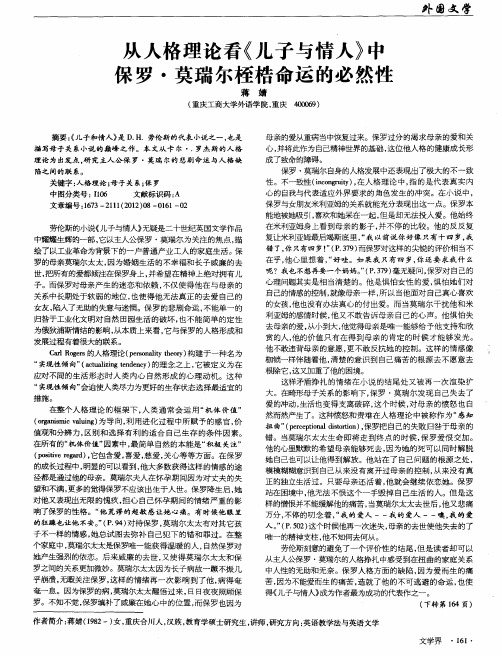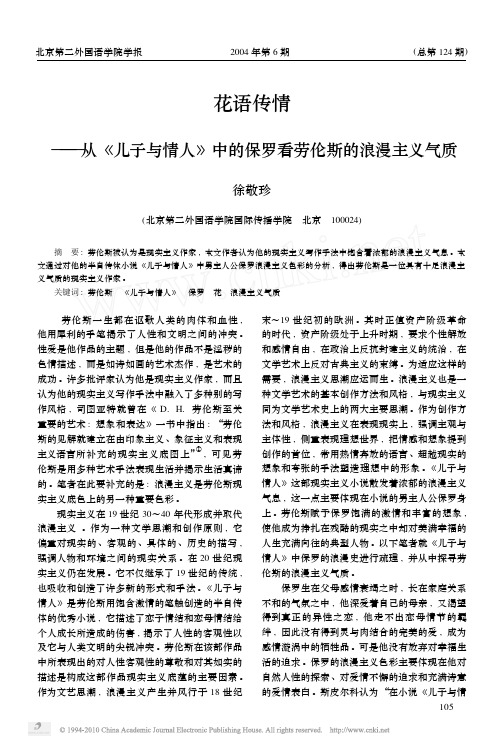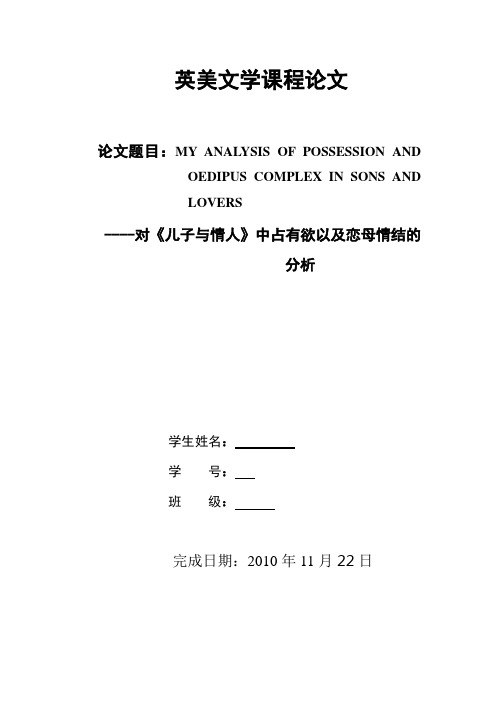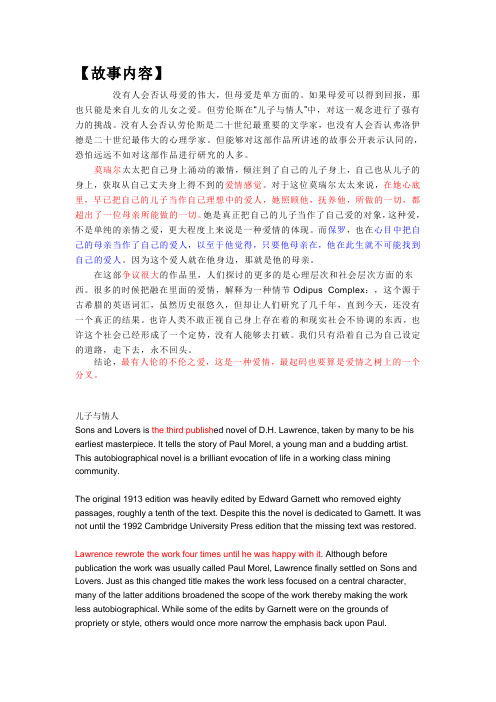《儿子与情人》论文:《儿子与情人》中的男性气质
- 格式:doc
- 大小:34.50 KB
- 文档页数:6

《儿子与情人》:家庭、性与自我认知简介《儿子与情人》是一部探讨家庭、性与自我认知的电影。
故事围绕主角儿子和他的情人展开,通过剖析他们之间的关系,深入探讨了家庭对个体性格形成以及自我认知的重要影响。
家庭对儿子成长的影响•常规性别角色塑造:父母对儿子童年时期进行性别角色教育,如男孩应该强壮勇敢、承担责任等。
这种社会化给予了儿子具备诸多传统男性特质的良好基础。
•家庭氛围与安全感:一个稳定、温暖的家庭环境有助于培养健康的自尊心和安全感,使儿子在外界面临挑战时更加坚定和自信。
家庭对性取向的影响•家族价值观传递:个体的价值观常常来源于家族传统观念,特别是在涉及到性取向这样敏感话题上。
•家长反应:父母如何接受子女的性取向会对其自我认知产生深远影响,容忍和接纳或者排斥与歧视都可能导致不同的结果。
心理学视角下的自我认知•自尊和幸福感:个体对自身性取向的认知和接受程度与其自尊心以及幸福感之间存在着紧密联系。
•性别身份:性取向也与个体在社会中获得性别身份的方式密切相关。
通过反思、接纳和沟通,个体可以更好地塑造并展现出真实的自己。
亲密关系与个人认同•情侣关系对认同感的影响:儿子和情人之间形成了一种特殊的亲密关系,这样的关系可以在一定程度上满足儿子对被理解、被接受和被珍视的需求。
•外界评价对个人认同感的冲击:但是,外界社会对儿子和情人之间关系的非议和质疑也让他们面对来自周围世界观念上带来了挑战。
面对这种压力,他们需要通过内省、勇气、坚持并寻求心理支持来塑造自己的认同感。
结论《儿子与情人》这部电影精细描绘了家庭、性与自我认知之间的关系。
通过剧情展示了家庭对个人性格形成和自我认知的重要影响,同时也提醒我们外界对个体性取向的评价如何影响着他们的社会认同感。
这部电影给予我们深思,将我们引向探究个体成长、性别身份和社会接受之间不断互动的世界。


花语传情———从《儿子与情人》中的保罗看劳伦斯的浪漫主义气质徐敬珍(北京第二外国语学院国际传播学院 北京 100024) 摘 要:劳伦斯被认为是现实主义作家,本文作者认为他的现实主义写作手法中饱含着浓郁的浪漫主义气息。
本文通过对他的半自传体小说《儿子与情人》中男主人公保罗浪漫主义色彩的分析,得出劳伦斯是一位具有十足浪漫主义气质的现实主义作家。
关键词:劳伦斯 《儿子与情人》 保罗 花 浪漫主义气质 劳伦斯一生都在讴歌人类的肉体和血性,他用犀利的手笔揭示了人性和文明之间的冲突。
性爱是他作品的主题,但是他的作品不是淫秽的色情描述,而是如诗如画的艺术杰作,是艺术的成功。
许多批评家认为他是现实主义作家,而且认为他的现实主义写作手法中融入了多种别的写作风格,司图亚特就曾在《D.H.劳伦斯至关重要的艺术:想象和表达》一书中指出:“劳伦斯的见解就建立在由印象主义、象征主义和表现主义语言所补充的现实主义底图上”①,可见劳伦斯是用多种艺术手法表现生活并揭示生活真谛的。
笔者在此要补充的是:浪漫主义是劳伦斯现实主义底色上的另一种重要色彩。
现实主义在19世纪30~40年代形成并取代浪漫主义。
作为一种文学思潮和创作原则,它偏重对现实的、客观的、具体的、历史的描写,强调人物和环境之间的现实关系。
在20世纪现实主义仍在发展。
它不仅继承了19世纪的传统,也吸收和创造了许多新的形式和手法。
《儿子与情人》是劳伦斯用饱含激情的笔触创造的半自传体的优秀小说,它描述了恋子情结和恋母情结给个人成长所造成的伤害,揭示了人性的客观性以及它与人类文明的尖锐冲突。
劳伦斯在该部作品中所表现出的对人性客观性的尊敬和对其如实的描述是构成这部作品现实主义底蕴的主要因素。
作为文艺思潮,浪漫主义产生并风行于18世纪末~19世纪初的欧洲。
其时正值资产阶级革命的时代,资产阶级处于上升时期,要求个性解放和感情自由,在政治上反抗封建主义的统治,在文学艺术上反对古典主义的束缚。

儿子与情人:禁忌之爱的恋曲引言《儿子与情人》是一部引人深思的电影,讲述了儿子和母亲的禁忌之恋。
这种主题在电影和文学中并不常见,因此引起了广泛的关注和讨论。
本文将从多个角度探讨这一禁忌之爱的恋曲。
剧情梗概电影《儿子与情人》讲述了一个复杂而扑朔迷离的故事。
男主角约翰是一个富有才华且少年气息未褪尽的作家,他对母亲安妮心存敬爱和依赖之情。
然而,在某种机缘下,约翰渐渐发现自己对母亲有着超越常规关系的感情。
禁忌之爱母子关系与性心理母子关系是每个人生命中最早建立的关系之一,在成长过程中对个体产生重要影响。
然而,当这种关系超越亲情界限时,就会引发伦理和道德上的困扰。
社会反应与观众回应由于这种禁忌之恋与社会规范相悖,观众对这类题材的接受度往往各不相同。
有些观众可能感到震惊和愤怒,认为这种关系是道德沦丧的表现,而另一些观众则可能更加关注角色的心理状态和动机。
电影对禁忌之爱的处理《儿子与情人》以前卫而犀利的方式探索了禁忌之恋。
导演通过细腻的画面语言和情感表达,展示了约翰与母亲安妮之间复杂而纠结的感情。
观众在欣赏电影时会被引导思考道德、伦理和文化背景对个人感情选择的影响。
文学与艺术中的禁忌恋曲除了电影,《儿子与情人》这一主题在文学和艺术作品中也有所体现。
例如,许多小说、诗歌和戏剧作品都描绘了类似主题,如《奥德赛》、《哈姆雷特》等。
禁忌之爱与心理学心理学家常常研究个体发展中涉及家庭和亲密关系的问题。
禁忌之恋在心理学中被视为一种复杂而令人困惑的情感状态,具有独特而深远的心理影响。
总结《儿子与情人》这部电影勇敢地探讨了禁忌之爱的主题,引发了公众对这类题材的思考和讨论。
通过探索母子关系、社会反应、艺术表达和心理学等多个角度,我们可以更好地理解禁忌之恋的复杂性和影响。

英美文学课程论文论文题目:MY ANALYSIS OF POSSESSION ANDOEDIPUS COMPLEX IN SONS ANDLOVERS----对《儿子与情人》中占有欲以及恋母情结的分析学生姓名:学号:班级:完成日期:2010年11月22日My Analysis of Possession and Oedipus complex in Sons andLoversAbstractDavid Herbert Lawrence is one of the greatest English novelists of the 20th century. During his life-long literary career, he had written more than ten novels and several short stories. He wrote a lot of great works, one of his most popular novels is Sons and Lovers. This novel is about the life of the Morels’ family. Mr. Morel, Mrs. Morel, willwam, Paul, Miriam and Clara are the main characters in this novel. The author develops the story by portraying the relationships between these characters. But the end of the relationship is a tragedy. And nowadays we also can find this kind of tragedy there and here in the world. It’s because of the possession that cause the tragedy .This thesis will prove this view from the possession of different relationships. That’s the possession of wife to husband, the possession of mother to sons, and the possession of two girl friends to Paul and Paul's Oedipus complex to analyze the destruction of possession.Key words: Oedipus complex;tragedy;relationship;Possession对《儿子与情人》中占有欲以及恋母情结的分析摘要劳伦斯是20世纪最伟大的英国小说家之一。

【故事内容】没有人会否认母爱的伟大,但母爱是单方面的。
如果母爱可以得到回报,那也只能是来自儿女的儿女之爱。
但劳伦斯在“儿子与情人”中,对这一观念进行了强有力的挑战。
没有人会否认劳伦斯是二十世纪最重要的文学家,也没有人会否认弗洛伊德是二十世纪最伟大的心理学家。
但能够对这部作品所讲述的故事公开表示认同的,恐怕远远不如对这部作品进行研究的人多。
莫瑞尔太太把自己身上涌动的激情,倾注到了自己的儿子身上,自己也从儿子的身上,获取从自己丈夫身上得不到的爱情感觉。
对于这位莫瑞尔太太来说,在她心底里,早已把自己的儿子当作自己理想中的爱人,她照顾他,抚养他,所做的一切,都超出了一位母亲所能做的一切。
她是真正把自己的儿子当作了自己爱的对象,这种爱,不是单纯的亲情之爱,更大程度上来说是一种爱情的体现。
而保罗,也在心目中把自己的母亲当作了自己的爱人,以至于他觉得,只要他母亲在,他在此生就不可能找到自己的爱人。
因为这个爱人就在他身边,那就是他的母亲。
在这部争议很大的作品里,人们探讨的更多的是心理层次和社会层次方面的东西。
很多的时候把融在里面的爱情,解释为一种情节Odipus Complex:,这个源于古希腊的英语词汇,虽然历史很悠久,但却让人们研究了几千年,直到今天,还没有一个真正的结果。
也许人类不敢正视自己身上存在着的和现实社会不协调的东西,也许这个社会已经形成了一个定势,没有人能够去打破。
我们只有沿着自己为自己设定的道路,走下去,永不回头。
结论,最有人伦的不伦之爱,这是一种爱情,最起码也要算是爱情之树上的一个分叉。
儿子与情人Sons and Lovers is the third publish ed novel of D.H. Lawrence, taken by many to be his earliest masterpiece. It tells the story of Paul Morel, a young man and a budding artist. This autobiographical novel is a brilliant evocation of life in a working class mining community.The original 1913 edition was heavily edited by Edward Garnett who removed eighty passages, roughly a tenth of the text. Despite this the novel is dedicated to Garnett. It was not until the 1992 Cambridge University Press edition that the missing text was restored.Lawrence rewrote the work four times until he was happy with it. Although before publication the work was usually called Paul Morel, Lawrence finally settled on Sons and Lovers. Just as this changed title makes the work less focused on a central character, many of the latter additions broadened the scope of the work thereby making the work less autobiographical. While some of the edits by Garnett were on the grounds of propriety or style, others would once more narrow the emphasis back upon Paul.In 1999, the Modern Library ranked Sons and Lovers ninth on a list of the 100 best novels in English of the 20th century.Part I:The refined daughter of a "good old burgher family," Gertrude Coppard meets arough-hewn miner at a Christmas dance and falls into a whirlwind romance. But soon after her marriage to Walter Morel, she realizes the difficulties of living off his meager salary in a rented house. The couple fight and drift apart and Walter retreats to the pub after work each day. Gradually, Mrs. Morel's affections shift to her sons, beginning with the oldest, William.As a boy, William is so attached to his mother that he doesn't enjoy the fair without her. As he grows older, he defends her against his father's occasional violence. Eventually, he leaves home for a job in London, where he begins to rise up into the middle class. He is engaged, but he detests the girl's superficiality. He dies, and Mrs. Morel is heartbroken, but when Paul catches pneumonia, she rediscovers her love for her second son.Part II:Both repulsed by and drawn to his mother, Paul is afraid to leave her but wants to go out on his own, and needs to experience love. Gradually, he falls into a relationship with Miriam, a farm girl who attends his church. The two take long walks and have intellectual conversations about books, but Paul resists, in part because his mother looks down on her. At work, Paul meets Clara Dawes, who has separated from her husband, Baxter.Paul leaves Miriam behind as he grows more intimate with Clara, but even she cannot hold him, and he returns to his mother. When his mother dies soon after, he is alone.Lawrence summarised the plot in a letter to Edward Garnett on 12 November 1912:It follows this idea: a woman of character and refinement goes into the lower class, and has no satisfaction in her own life. She has had a passion for her husband, so her children are born of passion, and have heaps of vitality. But as her sons grow up she selects them as lovers — first the eldest, then the second. These sons are urged into life by their reciprocal love of their mother — urged on and on. But when they come to manhood, they can't love, because their mother is the strongest power in their lives, and holds them. It's rather like Goethe and his mother and Frau von Stein and Christiana — As soon as the young men come into contact with women, there's a split. William gives his sex to a fribble, and his mother holds his soul. But the split kills him, because he doesn't know where he is. The next son gets a woman who fights for his soul — fights his mother. The son loves hismother — all the sons hate and are jealous of the father. The battle goes on between the mother and the girl, with the son as object. The mother gradually proves stronger, because of the ties of blood. The son decides to leave his soul in his mother's hands, and, like his elder brother go for passion. He gets passion. Then the split begins to tell again. But, almost unconsciously, the mother realises what is the matter, and begins to die. The son casts off his mistress, attends to his mother dying. He is left in the end naked of everything, with the drift towards death.This is the most autobiographical of all Lawrence's works as the author himself had a similar relationship with his own mother. The use of this oedipal theme is one of a number of Freudian concepts he used throughout his books. Like many of his works, Sons and Lovers was criticized when first published for obscenity and one publisher called it "the dirtiest book he had ever read" but compared to his later works it is quite constrained.The leading character-Paul ,grows up in a miner‟s family where is full of love and hatred .His mother is disappointed in his father who always get drunk ,so his mother gives all love to him .AS his growing up ,the emotion between Paul and his mother becomes deep day after day ,so that Paul loves Miriam ,but he can‟t marry her ,then he only can keep ambiguous relationship with Clara who has husband .The love to his mother torments Paul all the time , even if released from “Oedipus complex” ,because his mother takes away his spirit prop .提问者:mavis882 - 二级最佳答案The parents of the central character, Paul, are Mr and Mrs Morel who are a vigorous and heavy-drinking miner and a well-educated, pretty intellectual respectively. We learn of Paul’s successful brother and sister, William and Annie, but are soon drawn into Paul’s world. He is still in his teens but works in a factory producing surgical appliances but becomes sick and spends his time with Miriam Leivers who he falls in love with. Their love is made difficult by Miriam’s intense and religious nature and the fondness Paul’s mother has for him that is protective to the point of dependence. As Paul reaches his early twenties he becomes passionate and makes love to Miriam but this ecstasy spells the end for their relationship. The latter stages of the novel concern Paul’s next passion - Mrs Clara Dawes - and her vengeful husband. In the end, with Mrs Morel’s slow death, we find that the closest and most meaningful bond is held between mother and son.儿子与情人》中主要人物的原型分析∙∙ny152ccl68∙5位粉丝∙1楼■徐敬珍《名作欣赏(下半月)》2006年第7期纯文学期刊-域外视野摘要:本文作者用卡尔·荣格的原型分析理论,解析了《儿子与情人》中主要人物梅瑞拉姆、保罗和克拉拉的原型,并揭示了劳伦斯在文中所表达的对占有欲强烈并争强好胜的女性的反感和男性在男女交往中应占统治地位的思想,同时也揭露了劳伦斯对自己独特的宗教观的宣扬:即以身心统一、和谐完美的性爱为基础的、以男性为主宰的婚姻才是拯救人类的唯一途径。
《儿子与情人》的作文儿子与情人无论在何时何地,儿子与情人之间的关系都充满着诸多的纠纷和矛盾。
作为一个年轻而又有为的儿子,我想就这个话题进行一番探讨,以期能够更好地理解和处理这种复杂的关系。
回首过去,我认识到儿子与情人之间的矛盾来源于各种不同的因素。
首先,儿子通常与情人在兴趣爱好、价值观和生活方式等方面存在着差异。
作为一个成长中的年轻人,儿子自然会追求与时俱进、充满朝气和活力的生活方式,而情人则可能偏向于稳重和传统。
这种差异导致儿子与情人之间的交流和理解存在一定的障碍。
其次,家人的期望对儿子与情人关系的发展也有着重要的影响。
家人通常希望儿子能够与情人建立稳定而长久的关系,因此他们对情人的期望也更高。
然而,在满足家人期望的同时,儿子也需要考虑自己内心真实的想法和感受,这就增加了他们在处理与情人相处时的困难。
另外,文化和传统观念也在一定程度上决定了儿子与情人之间的矛盾。
在某些文化背景下,家庭的意志往往被认为是至高无上的,而儿子则应该将家庭责任放在首位。
然而,在现代社会中,个人的追求和发展也越来越重要,这使得儿子不得不在履行家庭责任和追求自己的幸福之间做出抉择。
面对这种矛盾和纠纷,儿子首先应该在沟通和理解上下功夫。
只有通过积极的沟通,双方才能更好地了解彼此的需求和期望。
儿子应该尊重情人的意见,并且试图与她建立共同的认知和共识。
同时,情人也应该学会倾听和理解儿子的想法,并且尊重他追求个人发展和幸福的权利。
同时,儿子也应该学会在家人期望和自己想法之间寻找平衡点。
他需要告诉家人自己的真实想法和感受,与他们进行建设性的对话和交流。
通过互相尊重和理解,儿子与家人之间的关系可以更加和谐,这也为儿子与情人之间的关系创造了更好的条件。
最后,儿子需要学会处理文化和传统观念对自己的影响。
他应该理解和尊重传统价值观,但也要明确表达自己的观点和追求。
这需要儿子具备独立思考和判断的能力,同时也需要他有足够的勇气去追求自己的幸福和发展。
《儿子与情人》论文:《儿子与情人》中的男性气质【中文摘要】D. H.劳伦斯是20世纪英国的杰出文学家,《儿子与情人》是他的第三部小说,也是他的第一部重要的小说。
故事发生在19世纪工业化的英国,以一个名叫河川区的矿区为背景,描写了矿工莫瑞尔一家的生活以及他的几个子女的成长经历。
国内外许多专家学者从不同视角对《儿子与情人》进行了解读,但大多专注于心理分析或者文本解读,而针对莫瑞尔父子三人男性气质的研究的论文却不多见。
就国内外《儿子与情人》的研究现状而言,评论家主要以心理分析和文本分析为理论依据,围绕文本中的两个主要人物保罗和他的母亲莫瑞尔太太进行分析。
事实上,保罗的父亲莫瑞尔和兄长威廉在小说中也有很重要的地位,他们理应得到关注。
莫瑞尔及其子威廉和保罗的生活经历是三部不同的有关男性气质的历史。
莫瑞尔的经历是一部充满挫折及心酸的历史;威廉的经历是一部激情与不安并存的历史;保罗的经历则是一部有惊无险的历史。
本论文共分三个部分。
第一部分包括《儿子与情人》国内外研究现状的综述、本论文的研究问题、研究、研究方法、及论文的整体框架。
第二部分(论文的第一、二、三、四章)是论文的主干部分,分别论述了男性气质的理论,莫瑞尔,威廉及保罗的男性气质维护和建构历史。
第一章是男性气质研究的简要历史,介绍了这一概念的产生发展史及在不同历史时期的不同体现。
本章还介绍了澳大利亚社会学家康奈尔对不同类型男性气质的界定,说明了莫瑞尔、威廉和保罗分别代表了康奈尔划分的共谋性、支配性边缘性的男性气质。
第二章是关于莫瑞尔受伤的男性气质。
首先论述了莫瑞尔太太如何尽力将丈夫的男性气质消解,及莫瑞尔如何尽最大努力来维护其共谋性男性气质。
其次论述了莫瑞尔家的子女们,在其母亲的教唆下,如何伙同他们的母亲将父亲的男性气质消解掉,及莫瑞尔怎样维护自己作为男性的尊严的。
第三章分析了威廉建构支配性男性气质的过程。
威廉从小就有建立支配性男性气质的雄心,其雄心得到了母亲充分的挖掘与培养。
俄狄浦斯母题的现代嬗变《儿子与情人》论文导读::海边的卡夫卡》和《儿子与情人》》中的母亲恰好代表了这两极。
海边的卡夫卡》主人公卡夫卡幼年时被母亲抛弃。
论文关键词:《儿子与情人》,《海边的卡夫卡》,弑父娶母ThechangeofthemotifOedipus《俄狄浦斯王》(OedipusThe King)中英雄俄狄浦斯犯下杀父娶母的大罪浑然不觉,当他发现真相后痛悔不已,刺瞎双眼,自我流放。
这原本是古希腊的一个神话故事,后来经索福克勒斯妙笔阐释,成为文学史上悲剧的典范之作。
俄狄浦斯的故事是世界范围内一个经久不衰的文学母题,俄狄浦斯是人类命运的原型。
荣格认为,原型犹如一道“河床”它使人类的生命之流始终遵循同样的路线,沿着河床“奔涌成一条大江”俄狄浦斯作为人类命运的原型不仅代表过去,而且预示未来,它就是一条河床,人类无数生命沿着这一模式一代又一代演绎着。
【1】后人对俄狄浦斯这个质朴而深刻的主题的每一次创造性使用都为古老的神话和传说注入新的活力。
无独有偶,当代英国作家劳伦斯的《儿子与情人》和日本极具现代意识的作家村上春树的《海边的卡夫卡》都巧妙地沿用了俄狄浦斯故事的母题和意象并将其赋予新的内涵,赋予反父恋母新的历史意义,隐含着作者对生命个体成长的探索和判断。
一俄狄浦斯犯下的第一个大错就是弑父。
人性中的魔性潜藏在他心中,当拉伊俄斯阻挡了他追寻自我之途时,他就杀死了拉伊俄斯。
当王后有利于他通往自我之途时,他就娶王后为妻,所以俄狄浦斯的伦理罪行是预定的。
但是就个体而言,俄狄浦斯是无罪的。
在他杀父娶母的预言降临之前,他并没有做过错事,他杀父娶母也并非有意。
特别是真相大白之后,他勇敢地承担起了责任。
那么俄狄浦斯弑父的正义性何在?首先《儿子与情人》,俄狄浦斯的父亲拉伊俄斯曾劫持恩人帕罗普斯的儿子,于是神诅咒他必然遭受报应,最终死于儿子之手。
子杀父,是对父的不义行为的惩罚。
所以,俄狄浦斯杀掉父亲就具有正义的一面。
其次,神话与人类进程中的历史有关,远古时代杀父娶母是一种普遍现象。
《儿子与情人》论文:《儿子与情人》中的男性气质【中文摘要】D. H.劳伦斯是20世纪英国的杰出文学家,《儿子与情人》是他的第三部小说,也是他的第一部重要的小说。
故事发生在19世纪工业化的英国,以一个名叫河川区的矿区为背景,描写了矿工莫瑞尔一家的生活以及他的几个子女的成长经历。
国内外许多专家学者从不同视角对《儿子与情人》进行了解读,但大多专注于心理分析或者文本解读,而针对莫瑞尔父子三人男性气质的研究的论文却不多见。
就国内外《儿子与情人》的研究现状而言,评论家主要以心理分析和文本分析为理论依据,围绕文本中的两个主要人物保罗和他的母亲莫瑞尔太太进行分析。
事实上,保罗的父亲莫瑞尔和兄长威廉在小说中也有很重要的地位,他们理应得到关注。
莫瑞尔及其子威廉和保罗的生活经历是三部不同的有关男性气质的历史。
莫瑞尔的经历是一部充满挫折及心酸的历史;威廉的经历是一部激情与不安并存的历史;保罗的经历则是一部有惊无险的历史。
本论文共分三个部分。
第一部分包括《儿子与情人》国内外研究现状的综述、本论文的研究问题、研究、研究方法、及论文的整体框架。
第二部分(论文的第一、二、三、四章)是论文的主干部分,分别论述了男性气质的理论,莫瑞尔,威廉及保罗的男性气质维护和建构历史。
第一章是男性气质研究的简要历史,介绍了这一概念的产生发展史及在不同历史时期的不同体现。
本章还介绍了澳大利亚社会学家康奈尔对不同类型男性气质的界定,说明了莫瑞尔、威廉和保罗分别代表了康奈尔划分的共谋性、支配性边缘性的男性气质。
第二章是关于莫瑞尔受伤的男性气质。
首先论述了莫瑞尔太太如何尽力将丈夫的男性气质消解,及莫瑞尔如何尽最大努力来维护其共谋性男性气质。
其次论述了莫瑞尔家的子女们,在其母亲的教唆下,如何伙同他们的母亲将父亲的男性气质消解掉,及莫瑞尔怎样维护自己作为男性的尊严的。
第三章分析了威廉建构支配性男性气质的过程。
威廉从小就有建立支配性男性气质的雄心,其雄心得到了母亲充分的挖掘与培养。
威廉缺少男性气质的榜样,同时他在精神和肉体上分别受控于母亲和女友,无法获得独立。
他尽力摆脱母亲的控制以得到自我独立,然而以失败和死亡为结局,支配性男性气质更无从可谈。
第四章探讨了保罗的男性气质的建构。
保罗开始不清楚自己想要建构什么类型的男性气质,后来决心成为一名艺术家并建构边缘性男性气质。
为了获取独立,他必须摆脱母亲及两位女友的控制,她们分别是保罗的母亲精神与肉体层面的化身。
保罗最终摆脱了这三个女人的控制,将一切过往抛在了身后,去城市开始了新的生活。
第三部分为结论。
在前几章分析的基础上,本部分将简要总结莫瑞尔、威廉和保罗父子三人维护,建立自己男性气质成败的经验教训。
【英文摘要】D. H. Lawrence is a distinguished British writer in 20th century. Sons and Lovers (SL) is his third and also the first important novel. The story happens in the industrialized England, and its background is a mining community called Bottom. It describes the family life of theminer Walter Morel and the growth experiences of his several children. Scholars abroad and home have thoroughly studied the novel in different perspectives, however, most of them are focused on psychoanalysis and textual analysis,and few papers are on the masculinities of the males in Morel family.Critics at home and abroad mainly pay their attention on the two main characters Paul and his mother Mrs. Morel, using psychoanalysis and textual analysis. In fact, Paul’s father Morel and his brother William are also very important figures in the novel, and they deserve equal attention.The life experiences of Morel and his two sons William and Paul are different histories of masculinity. Morel experiences a frustrated and bitter history of masculinity preserving. William experiences a thrilled and restless history of hegemonic masculinity constructing. Paul experiences an excited history on marginalized masculinity constructing.This thesis falls into three parts. The first part is the introduction. It offers a brief literary review of Sons and Lovers, and also provides research background, question, motivation, methodology, and organization of this thesis.The second part, including four chapters, is the main body of this thesis. It contains the introduction of masculinity and Morel’s history of masculinity preserving, William’s and Paul’shistories of masculinity constructing. Chapter one is a brief history of masculinity study, about the process of its emergence and its different manifestations in different historical periods; it also introduces Australian sociologist Connell’s different types of masculinity, and then it shows that Morel, William and Paul, the three males of Morel family, are respectively representatives of complicit, hegemonic and marginalized masculinity.Chapter two is on Walter Morel’s wounded masculinity. Firstly, it shows how Mrs. Morel tries to emasculate her husband, and how Morel tries his best to hold his complicit masculinity. Secondly, it shows, how the children of Morel’s, under the teachings of their mother, despise their father, and help their mother emasculate their father.Chapter three is on William’s effort in constructing hegemonic masculinity. William has ambition on hegemonic masculinity since he is a little boy. His mother cultivates and also encourages his ambition. William’s masculine model is in wanting, and also, he is not an independent man, emotionally and physically. He tries to break off the control of his mother and be self-independent, failed, he dies. Hegemonic masculine identity is only a dream.The last chapter is on Paul’s masculinity constructing. At first, Paul does not know whatkind of masculinity he wants to obtain. Then he decides to bean artist and build a marginalized masculine identity. To beself-independent, he must get rid of the confinement of his mother and his two girlfriends, who resemble his mother in the emotional level and physical level respectively. So he breaksaway from them three, leaves all the past in the past, and goesto city for a new life.The third part is a brief conclusion. Based on the analysis of the former chapters, this chapter will summarize the lessons learned in the process of masculinity preserving and constructing of Morel, William and Paul.【关键词】《儿子与情人》莫瑞尔威廉保罗男性气质【英文关键词】Sons and Lovers Morel William Paul masculinity complicit【备注】索购全文在线加好友:1.3.9.9.3.8848同时提供论文写作一对一指导和论文发表委托服务【目录】《儿子与情人》中的男性气质Acknowledgements4-5摘要5-7Abstract7-8Introduction11-150.1 Research Background11-120.2 Research Motivation, Methodology and Questions12-140.3 The Organization of ThisThesis14-15Chapter 1 Masculinities and Sons andLovers15-25 1.1 Masculinity’s Formation andStudy15-18 1.2 Connell’s different Types of Masculinities18-21 1.3 The Feasibility of a Masculinity Study21-25Chapter 2 The Wounded Complicit Masculinity of Walter Morel25-37 2.1 Masculinity Wounded by HisWife25-30 2.2 Masculinity Wounded by HisChildren30-37Chapter 3 The Unsuccessful Hegemonic Masculinity of William37-49 3.1 An Overt Desire for Hegemonic Masculinity37-43 3.2 The Failure of Hegemonic Masculinity Constructing43-49Chapter 4 The Self-made Marginalized Masculinity of Paul49-61 4.1 Hidden Desires for Masculinity49-54 4.2 The Self-made Marginalized Masculinity54-61Conclusion61-65Works Cited65-69攻读学位期间发表的学术论文目录69-70。